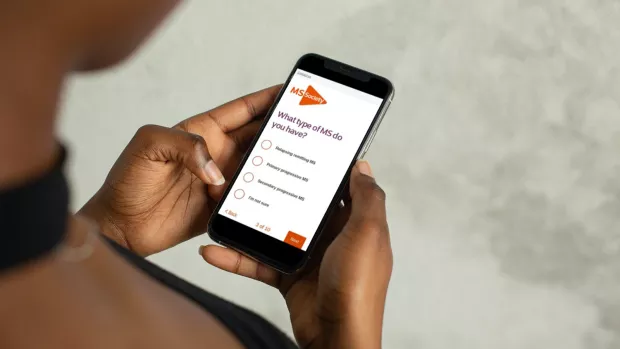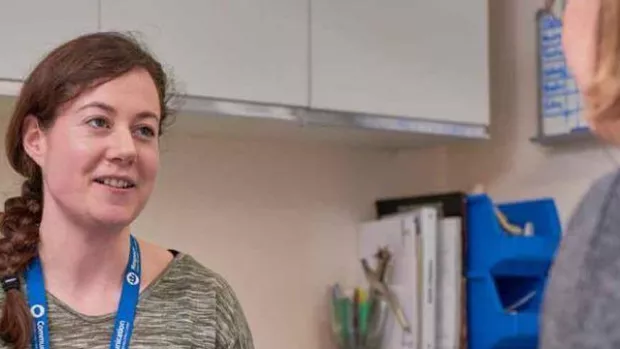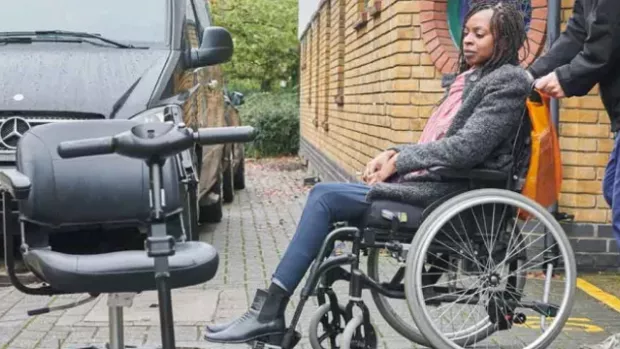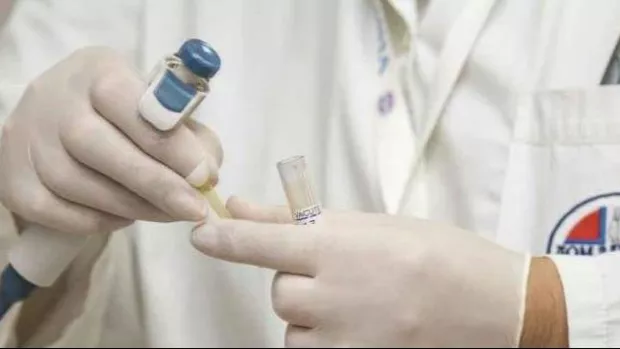
Disease modifying therapies
Disease modifying therapies (DMTs) aren't a cure for MS, but they can reduce how many relapses someone has and how serious they are. They can also slow down the damage caused by MS that builds up over time.
Disease Modifying Therapies (DMTs) are treatments that could change (for the better) how your MS develops over time.
A DMT could be a drug you take. Sometimes you’ll hear them called ‘disease modifying drugs’ (DMDs). A DMT could also be a treatment that uses stem cells. A DMT isn’t a cure, but it could make a real difference to your MS. These treatments can offer many people the chance to take more control of their MS.
There are around 20 DMTs for MS available on the NHS. They're taken either as a pill, an injection or an infusion.
Our DMT decision tool is here to help you explore your DMT options and prepare for conversations with health professionals.
Find information about MS treatments during the COVID-19 pandemic
Explore disease modifying treatments for MS
Alemtuzumab (Lemtrada)
The European Medicines Agency (EMA) has reviewed the safety of alemtuzumab following reports of rare side effects.
Across the UK you can take alemtuzumab if you have relapsing MS and:
- despite already taking a DMT, you’ve still had a recent relapse and MRI scans show new signs that your MS is active (you have new lesions),
or
- you’ve had 2 relapses in the last year and you have new lesions on your MRI scans (whether you’re already on a DMT or not.
Most people have two courses of treatment spaced a year apart from each other. It's given through a drip (known as an infusion) in hospital. For the first course you go to hospital five days in a row. Each day you have an infusion that takes about four hours. You might go home every day two hours after your infusion or you may stay in hospital for the length of the treatment.
You have the second course a year later, over three days in a row, again for about four hours each day. For some people a third (or even fourth) course is needed. Again, this will be over three days in a row, for about four hours each day.
Avonex (interferon beta-1a)
In Scotland, Northern Ireland and Wales you can have Avonex (a brand name for one of the beta interferon drugs) if:
- you have relapsing MS and you’ve had a recent relapse and/or MRI scans show new signs that your MS is active (you have new lesions)
In England you can have this drug if:
- you’ve had two relapses in the last two years
- you’ve had one relapse in the last two years and MRI scans show new signs that your MS is active (you have new lesions)
Across the UK you can have this drug if:
- you have a clinically isolated syndrome or CIS (a first attack of MS-like symptoms) and a brain scan shows you’re likely to go on to get MS
It’s injected into the muscle once a week.
Betaferon (interferon beta-1b)
In Scotland, Northern Ireland and Walesyou can have Betaferon (a brand name for one of the beta interferon drugs) if:
- you have relapsing MS and you’ve had a recent relapse and/or MRI scans show new signs that your MS is active (you have new lesions)
In England you can have Betaferon if:
- you’ve had two relapses in the last two years
- you’ve had one relapse in the last two years and MRI scans show new signs that your MS is active (you have new lesions)
It’s injected under the skin every other day.
Cladribine (Mavenclad)
You can take cladribine (its brand name is Mavenclad) if:
- you have ‘highly active’ relapsing MS. This means you’ve had two or more disabling relapses in the past year and MRI scans show you have more, or bigger, lesions. Guidelines call this ‘rapidly evolving severe relapsing remitting MS’
or
- despite taking a DMT, you’ve had a relapse in the past year and new or bigger lesions can be seen on your MRI scans
You take this drug as a tablet in two courses. Each treatment course consists of two treatment weeks, one at the beginning of the first month and one at the beginning of the second month. This is then repeated a year later. Hopefully the two courses will control your MS and you won’t need any more treatment.
Daclizumab (Zinbryta) - withdrawn
Daclizumab (its brand name is Zinbryta) was withdrawn from the market on Friday 2 March 2018 after safety concerns. Anyone taking daclizumab should talk to their neurologist about treatment options.
Dimethyl fumarate (Tecfidera)
In Scotland, Wales and Northern Ireland you can have dimethyl fumarate (its brand name is Tecfidera) if:
- you have relapsing MS and you’ve had a recent relapse and/or MRI scans show new signs that your MS is active (you have new lesions)
In England you can have this drug if:
- you’ve had two relapses in the last two years
It’s a tablet you take twice a day.
Diroximel fumarate (Vumerity)
In Scotland you can have diroximel fumarate (its brand name is Vumerity) if:
- you have ‘active’ relapsing MS. This means you’ve had a recent relapse and/or MRI scans show new signs that your MS is active (you have new lesions).
Elsewhere in the UK
No decision has yet been made about whether this drug will be available on the NHS in other parts of the UK. A decision is expected sometime in 2022 for England and Wales, with one for Northern Ireland expected soon after.
Diroximel fumarate is a tablet you take twice a day.
Extavia (beta interferon-1b)
In Scotland, Northern Ireland& and Wales you can have Extavia (a brand name for one of the beta interferon drugs) if:
- you have relapsing MS and you’ve had a recent relapse and/or MRI scans show new signs that your MS is active (you have new lesions)
In England you can have this drug if:
- you’ve had two relapses in the last two years
- you’ve had one relapse in the last two years and MRI scans show new signs that your MS is active (you have new lesions)
- you have secondary progressive MS but you still have significant relapses (at least two in the last two years)
It's injected under the skin every other day.
Fingolimod (Gilenya)
In Scotland and Wales you can have fingolimod (its brand name is Gilenya) if:
- you have highly active relapsing remitting MS and another DMT hasn’t worked for you or
- you’ve had two or more disabling relapses in one year and an MRI scan shows you’re getting more lesions
In England and Northern Ireland you can have it if:
you have the same or an increased number of relapses despite treatment with beta interferons (Avonex, Rebif, Betaferon, Extavia and Plegridy), glatiramer acetate (Copaxone), dimethyl fumarate (Tecfidera) or teriflunomide (Aubagio)
Across the UK:
You might be switched to fingolimod if you’re taking natalizumab (Tysabri) and are at high risk of developing the brain infection PML.
Fingolimod can also be used as your first DMT if you have highly active relapsing MS or rapidly evolving severe relapsing remitting MS.
It’s a tablet you take once a day.
Glatiramer acetate (Copaxone)
In Scotland, Wales and Northern Ireland you can have glatiramer acetate (its brand name is Copaxone) if:
- you have relapsing MS and you’ve had a recent relapse and/or MRI scans show new signs that your MS is active (you have new lesions)
In England you can have this drug if:
- you’ve had two relapses in the last two years
- you’ve had one relapse in the last two years and MRI scans show new signs your MS is active (you have new lesions)
Across the UK you can have this drug if:
- you have a clinically isolated syndrome or CIS (a first attack of MS-like symptoms) and a brain scan shows you’re likely to go on to get MS.
It's injected under the skin using a pre-filled syringe once a day or three times a week.
HSCT
Haematopoietic stem cell transplantation (HSCT) is an intense chemotherapy treatment for MS.
It aims to stop the damage MS causes by wiping out and then regrowing your immune system, using your stem cells.
Natalizumab (Tysabri)
In Scotland, Wales and Northern Ireland you can have natalizumab (its brand name is Tysabri) if:
- you have relapsing MS and you’ve had a relapse in the last year and MRI scans show new signs that your MS is active (you have new lesions). This is despite taking another DMT
- you have relapsing MS and you’ve had at least two relapses in the last year and MRI scans show new signs that your MS is active. This is happening whether or not you’ve been taking another DMT
In England you can have this drug if:
- you have relapsing MS and you’ve had at least two relapses in the last year and MRI scans show new signs that your MS is active. This is happening whether or not you’ve been taking another DMT
Natalizumab is given through a drip (known as an infusion), which takes about an hour, with another hour to be monitored. You need to go to hospital once every four weeks for the infusion, but you don't need to stay overnight.
Ocrelizumab (Ocrevus)
Ocrelizumab is used to treat active relapsing MS or early primary progressive MS.
You’re given this drug through a drip (known as an infusion) in hospital once every six months.
Relapsing MS
Across the UK you can take ocrelizumab (its brand name is Ocrevus) if:
- you've got ‘active relapsing MS’. This means you’re having relapses or MRI scans show new lesions
- and you qualify to take alemtuzumab (Lemtrada) but that drug isn’t suitable for you
So, ocrelizumab is an alternative to alemtuzumab if you can’t take that drug for some reason, or you have worries about its side effects and risks.
Primary progressive MS
Since 2020 ocrelizumab is recommended across the UK to treat people if they have early primary progressive MS.
The following all also need to be true for you:
- your MRI scans show signs of inflammation. In particular, you need a scan to show you have a T1 gadolinium-enhancing lesion. Or you need two or more scans that show you have new or growing T2 lesions
- you have a score on the Expanded Disability Status Scale (EDSS) between 3.0 and 6.5. A score over 6.5 means you use a wheelchair all the time. People aren’t given DMTs, including ocrelizumab, if they’ve been using a wheelchair for at least six months. This is because there’s not enough evidence at the moment that DMTs will make enough difference to their MS.
What is ‘early’ primary progressive MS?
If you have primary progressive MS, your neurologist will decide if it’s ‘early’ or not based on how long you’ve had symptoms, and how much disability it’s caused you.
For primary progressive MS to be classed as ‘early’ - and for you to qualify to get ocrelizumab - your neurologist will follow this rule:
- if your EDSS score is over 5, your MS symptoms must not have started longer than 15 years ago
- if your score is 5 or under, your symptoms must not have started longer than 10 years ago.
The EDSS measures how much MS affects you, focusing on how well you can walk.
Ofatumumab (Kesimpta)
Across the UK you can have ofatumumab (its brand name is Kesimpta) if:
- you have relapsing MS and you’ve had a recent relapse and/or MRI scans show new signs that your MS is active (you have new lesions).
You inject ofatumumab under your skin once every four weeks. You do this with an injector pen.
Ozanimod (Zeposia)
In Scotland you can have ozanimod (its brand name is Zeposia) if:
- you have relapsing MS and you’ve had a recent relapse and/or MRI scans show new signs that your MS is active (you have new lesions). On top of that, a drug that comes as a tablet should be suitable for you, or that’s the type of drug you’ve asked for
Elsewhere in the UK
This drug isn’t available at the moment to treat MS on the NHS in England and Wales. When the National Institute for Health and Care Excellence (NICE) first looked at this drug at the start of 2021, they decided not to give the go ahead for people to get it on the NHS in England and Wales. NICE said there wasn’t enough evidence that it was better than other MS drugs already available. They felt ozanimod didn’t make enough difference to people’s MS to justify the price its makers wanted to charge the NHS. NICE are now looking again at this drug. A final decision should come later in 2021.
No decision has yet been made for Northern Ireland.
Ozanimod is a tablet you take once a day.
Plegridy (peginterferon beta 1a)
In Scotland, Northern Ireland and Wales you can have Plegridy (a brand name for one of the beta interferon drugs) if:
- you have relapsing MS and you’ve had a recent relapse and/or MRI scans show new signs that your MS is active (you have new lesions)
In& England you can have Plegridy if:
- you’ve had two relapses in the last two years
- you’ve had one relapse in the last two years and MRI scans show new signs that your MS is active (you have new lesions)
Across the UK you can have this drug if:
- you have a clinically isolated syndrome or CIS (a first attack of MS-like symptoms) and a brain scan shows you’re likely to go on to get MS
It's injected under the skin every two weeks.
Ponesimod (Ponvory)
Ponesimod (Ponvory)
You can have ponesimod (its brand name is Ponvory) if:
- you have ‘active’ relapsing MS. This means you’ve had a recent relapse and/or MRI scans show new signs that your MS is active (you have new lesions).
In England and Wales, it was approved by NICE for use on the NHS in December 2021.
Northern Ireland is expected to follow that NICE guidance.
In Scotland, it was already available after an earlier decision by the Scottish Medicines Consortium.
Ponesimod is a tablet you take once a day.
Rebif (beta interferon-1a)
In Scotland, Northern Ireland and Wales you can have Rebif (a brand name for one of the beta interferon drugs) if:
- you have relapsing MS and you’ve had a recent relapse and/or MRI scans show new signs that your MS is active (you have new lesions)
In England you can have these drugs if:
- you’ve had two relapses in the last two years
- you’ve had one relapse in the last two years and MRI scans show new signs that your MS is active (you have new lesions)
It's injected under the skin three times a week.
Across the UK you can have this drug if:
- you have a clinically isolated syndrome or CIS (a first attack of MS-like symptoms) and a brain scan shows you’re likely to go on to get MS
Siponimod (Mayzent)
Siponimod is used to treat active secondary progressive MS. Its brand name is Mayzent.
Across the UK you can take siponimod if:
- you've got ‘active secondary progressive MS’. Here ‘active’ means you’re still having relapses or MRI scans show new or growing lesions
You take this drug as a tablet once a day
Teriflunomide (Aubagio)
In Scotland, Wales and Northern Ireland you can take teriflunomide (its brand name is Aubagio) if:
- you have relapsing MS and you’ve had a recent relapse and/or if MRI scans show new signs that their MS is active (you have new lesions)
In& England you can have this drug if:
- you’ve had two relapses in the last two years
It’s a tablet that you take once a day.
Last full review:
We also update when we know about important changes.








